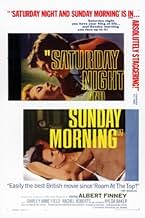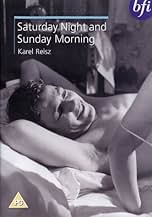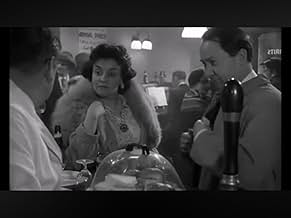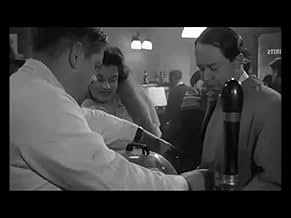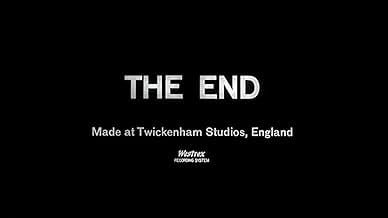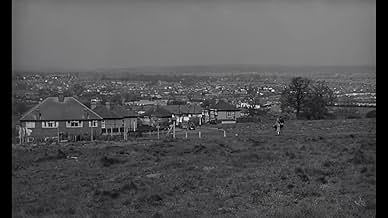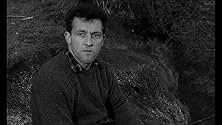Un trabajador en una fábrica sobrelleva dos relaciones con dos mujeres distintas, una de las cuales está casada pero esperando un hijo suyo.Un trabajador en una fábrica sobrelleva dos relaciones con dos mujeres distintas, una de las cuales está casada pero esperando un hijo suyo.Un trabajador en una fábrica sobrelleva dos relaciones con dos mujeres distintas, una de las cuales está casada pero esperando un hijo suyo.
- Ganó 3premios BAFTA
- 10 premios ganados y 3 nominaciones en total
- Mrs. Seaton
- (as Elsie Wagstaffe)
- Loudmouth
- (as Colin Blakeley)
Opiniones destacadas
Albert Finney as the surly Seaton is uncomfortably excellent. His bitter tone and attitude cuts like a power saw. Sooner or later his arrogance will be rewarded and you can't wait. He does display a tender side occasionally with Brenda the married woman but the softness is soon washed away as he rails against the system and his predicament. He is also a world class beer drinker which makes him even more unpleasant as he insults pub patrons and takes a nasty fall down a flight of stairs, only to lie there smiling. Pain is a major source of his existence and rowdy nights out like this serve in a perverse way to blunt it.
Director Karel Reisz moves the storyline along at a rapid pace capturing the grim existence of row house living and deafening factory work. It is a world of gray skies and defeated characters trying to make the best of what they have. They are not the "Happy Breed" of generations past.
Made in the first year of the tumultuous decade that changed the world forever Night is pretty tame by today's standards. But in it's day it was condemned by the Catholic Church for its blatant immorality. One might venture that it had an influence on John Lennon who wrote "Working Class Hero" and on many occasions was witnessed to act like the unctuous Seaton in his life. It might also be argued that Seaton was a prototype for the futuristic angry young man Alex the Droog in Clockwork Orange.
Betty Ann Field, Hylda Baker and Norman Rossington make up a convincing supporting cast in ably assisting Reisz in the world he depicts. Rachel Roberts is outstanding as the tragic Brenda. Smitten with Arthur and doomed by her predicament she perfectly conveys her situation with a tawdry lack of glamor.
Saturday Night and Sunday Morning may be an unpleasant film but it is a powerful and important one.
Today some will be puzzled by the dilemmas and themes to the point of "so what?"
Writer Alan Silitoe (from his own novel) quickly draws us in the to real world of a Nottingham factory worker. This is not the factory work of normal movies with the made-up hero having a blob of black stage paint across his forehead; more the dishevelled, sweaty, badly lit world that he knows from first hand experience.
In it we find Finney, smoking and gruff at his lathe. No actor, before him or after has ever made so much of an impression in a mundane situation as the ex-Shakespearen actor does here. Reality comes out of every pore. His matter-of-fact speaking voice, as a voice-over narrator, should not be underrated either - like someone giving testimony partly against their will.
His world of is one of petite rebellion and cheap thrills. The "fighting pit prop that wants a pint of beer." He is immoral and the wife of a friend is seen as fair game: Although the consequences are beyond his immature mind.
There is good supporting performances from British character actors such as Norman Rossington and Hylda Baker, but this movie belongs to one man and one man alone: Sir Albert Finney.
Twenty five years after he is dead the cinematic world is going to wake up and realize how brilliant an actor this man was: Like they did with Humphrey Bogart
"Neither of 'em's up to much, but it ain't our fault," he tells her. Like everything else in his unhappy life, it's all a matter of inheritance.
Arthur may share a name with a heroic English king, but he's not one to wear his lower-middle-class crown agreeably. He drinks away his wages, lashes out at defenseless women, and lies with discomfiting ease. But Albert Finney and the filmmakers make sure you care about him anyway.
As Seaton, Finney glowers a lot in the way you expect from a protagonist in a kitchen-sink drama, a celebrated product of British New Wave cinema. But the film plays with your expectations just as life does his. He doesn't want to settle for life as he finds it, and while "Saturday Night And Sunday Morning," Alan Sillitoe's adaptation of his own novel directed by Karel Reisz, spits a lot in the direction of conformity, it belies its angry-young-man pedigree with a sense of cosmic acceptance at taking what life has to offer.
Seaton's a "madhead," make no mistake. But he's not an especially honest one. He lies impulsively, often to no purpose, and is even proud of it. "I always was a liar, a good one and all," he tells the married woman he sleeps with, Brenda (Rachel Roberts). Ironically, it's his one honest moment on her behalf that lands him in real trouble.
The film gives us other hints Seaton is not an admirable figure, like shooting an annoying neighbor with an air rifle in a manner that comes off more creepy than defiant. A "working-class anti-hero," as other reviewers put it, and the real craft in both the direction and in Finney's performance is how it accomplishes the balancing act of establishing Seaton as both miserable company and a rooting interest.
It's a well-structured film, too, a quick 90 minutes that breaks neatly into thirty minutes of establishing the situation, thirty minutes of developing a crisis (Seaton stringing along two women, one pregnant), and thirty minutes of tense resolution. At the same time, Reisz gives his film a grimy authenticity that feels real, never stagy, with scenes that have a real lived-in quality while serving the larger story.
"Saturday Night And Sunday Morning" is a bleak film in many ways, not pleasant to watch. Laughs and insights are minimal, and Finney downplays his considerable screen charm. There are hardly any toothy grins like he'd bestow on his later breakout role, as the title character in "Tom Jones." The handling of his relationship with Doreen is a trifle pat, and too-simply resolved. So is the issue of his relationship with Brenda, although Finney shares a good final scene with her character's husband, played effectively by Stephen Fry lookalike Bryan Pringle.
There are a lot of good performances in this film, which blend together to create an effective if routine story. If it's not what you expect from angry-young-man cinema, it's nice to have your expectations batted down now and then.
The fact that it shocked audiences and local authorities because of its themes covering sex and abortion show that this was a time when a great deal of change was taking place in British society. Although I wasn't around then, things must have been changing very rapidly as six years later 'Alfie' was able to confront these issues full on whereas Karel Reisz's film merely hints at them.
This film also established Albert Finney as a national star and he was soon to become an international star with the wonderfully bawdy 'Tom Jones'. Its always interesting to see the films that established the actors we admire and I'm certainly a fan of Albert Finney so I was shocked when I saw this film and felt that he wasn't really very good in it.
The opening scene where his character, Arthur Seaton, is counting the parts he is making in his factory seemed to introduce a highly overwrought man that shouted all the time. Thankfully the unnecessary 'anger' at the start was toned down later but I still felt at the end that Finney could have done greater justice to his role.
Walking around with a straight back and his chest out, talking twice as loud as he needs to seemed to resemble an angry old man rather than an angry young man and I almost expected him to talk about how kids nowadays didn't know they were born.
Its unusual that an actor from a working class background didn't convince me when playing a character that was not that dissimilar from himself whilst actors like Tom Courtenay in 'Loneliness...' and particularly Richard Harris in 'This Sporting Life' did it much better.
However, I gradually found myself being more and more absorbed in this film as it started to develop a storyline and move away from a young man being angry simply for the sake of it.
Rachel Roberts excels in her role as the married woman who becomes pregnant by Seaton and its a shame that this actress has been forgotten when you consider her performance here and the marvellous one she gave opposite Harris in 'This Sporting Life'.
Shirley Anne Field also does well as Doreen the girl looking to settle down and it is in her relationship with Seaton where I disagree with many people's assessment of the film.
Its generally said that Seaton hates the idea of conformity but in the end accepts it. However I feel that the film is much more hopeful than that as he realises that love and marriage is not necessarily a trap that only fools rush into and that there is much more to conventional life than he had originally anticipated.
It's hard work growing up, it always was, and it always will be.
¿Sabías que…?
- TriviaThe factory scenes were filmed in the same factory that original author Alan Sillitoe worked in during the war when he was making shells and other artillery. At the time of filming, the factory was owned by the Raleigh bicycle company.
- ErroresWhen Arthur and Doreen meet for the first time, her packets of crisps on the counter disappear and reappear between shots.
- Citas
Arthur Seaton: Mam called me barmy when I told her I fell of a gasometer for a bet. But I'm not barmy, I'm a fighting pit prop that wants a pint of beer, that's me. But if any knowing bastard says that's me I'll tell them I'm a dynamite dealer waiting to blow the factory to kingdom come. I'm me and nobody else. Whatever people say I am, that's what I'm not because they don't know a bloody thing about me! God knows what I am.
- ConexionesFeatured in Viewpoint: We the Violent: Part 1 (1961)
Selecciones populares
- How long is Saturday Night and Sunday Morning?Con tecnología de Alexa
Detalles
- Fecha de lanzamiento
- País de origen
- Idioma
- También se conoce como
- Saturday Night and Sunday Morning
- Locaciones de filmación
- Productora
- Ver más créditos de la compañía en IMDbPro
Taquilla
- Presupuesto
- GBP 100,000 (estimado)
- Total a nivel mundial
- USD 370
- Tiempo de ejecución1 hora 29 minutos
- Color
- Relación de aspecto
- 1.66 : 1
Contribuir a esta página



